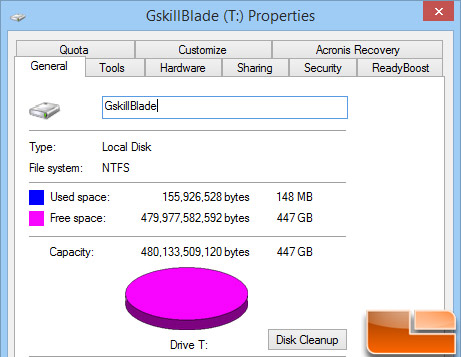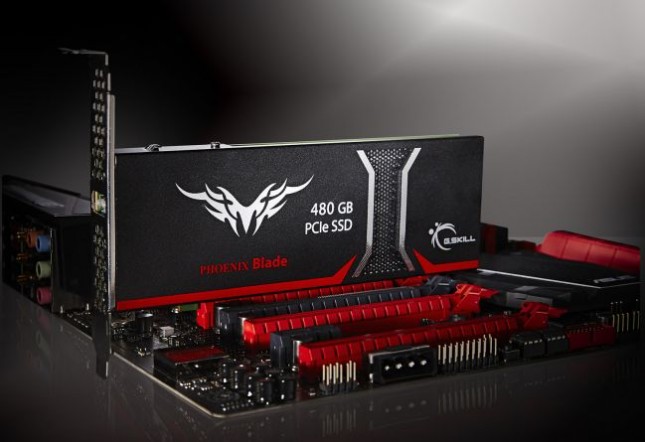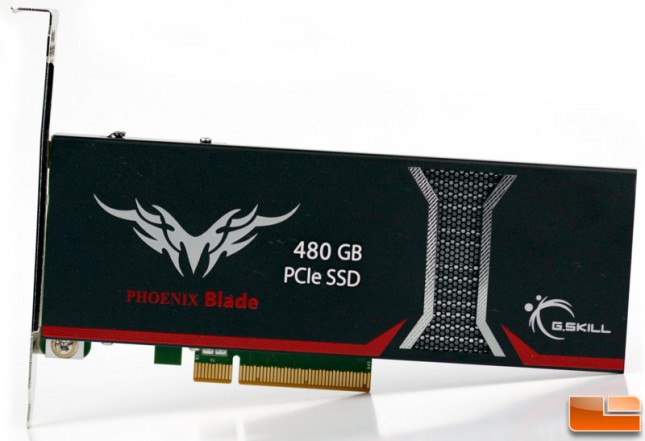G.SKILL Phoenix Blade 480GB PCIe SSD Review
Final Thoughts & Conclusions
Looking at the capacity of the G.SKILL Phoenix Blade 480GB PCIe SSD we saw total of 512GB(1GB byte = 1,000,000,000 bytes) of NAND on board and Windows reports the capacity accessible to the end user as 447 GiB (1Gib = 1,073,741,824 bytes) which is typical of a 480GB SandForce drive.
There are a few things that set this drive apart from OCZ’s offering such as the RevoDrive 350. First, it’s about $100 less expensive at $699.99 and second is the form factor. At only 170mm long and 70mm high, along with the optional short bracket, it can easily fit into smaller server boxes and systems where the RevoDrive just won’t fit. This is thanks to their stacked design and efficient use of PCB space. Pricing is pretty aggressive with it coming out to be ~$1.56 per usable GB. Much higher than what we see for 2.5″ drives but for a drive with gobs of NAND, four SF-2281 controllers along with the RAID controller, it’s very reasonable. There aren’t many drives like it on the market so there’s not a whole lot of competition in this space to really drive down pricing.
In terms of performance, there’s not doubt that this drive can really fly but performance can be a bit uneven depending on the operation and data being written. On sequential performance it screams, knocking out an observed 2065MB/s max reads and 1974MB/s max writes. This is best case scenario though and when faced with incompressible data and random writes, performance scales back a good bit but still way ahead of any SATA III based drive. The higher the queue depth, the stronger the performance which is nice except most users tend to compute in the lower queue depth range and therefore are unable to leverage the max capability full time. This is a product of the SandForce SF-2281 controller as we’ve seen countless times in the past. When it was first released, it ruled the pack but it’s showing its age but using an older controller is likely part of the reason G.SKILL able to offer the drive at a competitive price. Still, the overall performance is stellar when compared to traditional SATA based drives and I’d have no qualms about slapping one in my main system.
With that said, I’d be remiss if I didn’t note that the biggest pain with PCIe drives is the lack of flexibility currently offered by their SATA interfaced counterparts. There’s no hot-swapping available, some require the removal of the RAID configuration before secure erasing can be performed, available PCIe ports can be scarce, and the drives require special drivers to allow Windows to recognize them properly so they aren’t exactly plug and play. As to the latter, to image over an existing Windows instance is difficult at best, especially for those that have moved on past Windows XP. In the old days, you could interrupt the windows load to boot in safe mode, load the driver and then reboot but now the OS loads so fast that that opportunity is gone. This is something we encounter a lot because we image over the test OS for every drive so they all have a homogeneous test environment. If you are willing to spend the time and effort, it can be done but most should plan on starting with a fresh install of Windows.
Legit Bottom Line: If 480GB suits your storage needs and you have a PCIe X8 or better slot to spare, the G.SKILL Phoenix Blade PCIe SSD is priced right for those that want maximum performance without the hassle of mounting multiple drives in a RAID 0 configuration.




